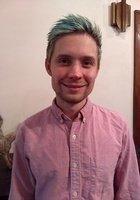I have been a teacher in some capacity for more than thirteen years and have taught an incredible range of educational levels and locales from Middle School in Austin, Texas to English as a Foreign Language in Beit Jala, Palestine to Arabic at The University of Cambridge. My personal pursuit of educational qualifications ended recently with the conference of my PhD in Middle Eastern Studies from The University of Cambridge in Cambridge, England. My drive to attain the advertised post, therefore, stems primarily from my lifelong affinity for teaching, and from my desire to give back to the educational system from which I have derived so many positive personal and professional benefits myself. In all of the aforementioned experience, I have been student-centered in my classroom approach aiming to optimize student learning and maximize student potential. My classroom (or online environment) emphasizes a comparative, global perspective in instruction while also attending to interdisciplinary perspectives between various courses and subjects with the goal of providing tangible, meaningful academic and social connections in the lives of my students. In the instruction of language, this goal is achieved chiefly through topic selection and student participation. Student ownership of the classroom environment is very important to student progress and outcomes and whilst I believe it is the exclusive purview of the instructor to establish clear evaluative measures and standards in a given course, the students can contribute to the manner in which learning outcomes are achieved in the class. Once students feel that they are part of the educational environment, the classroom dynamic changes markedly-and for the better. The classroom becomes a cooperative place, one where students and instructor are invested in a common goal for the benefit of all involved. This learner-focused approach has been lauded by my students; I was invited to teach a second year of Arabic at The University of Cambridge thanks to written requests from my first-year student cohort. In addition, my interdisciplinary, global perspective in instruction has proven beneficial to the numerous, highly diverse student groups I have been fortunate enough to instruct. This eclectic grouping includes students ranging from first-year undergraduates at The University of Cambridge to young, business-focused international students of English from continental Europe and East Asia to mature student-professionals from Kazakhstan and other parts of Central Asia. Experience teaching such diverse student-learners has proven invaluable to my approach as a social science teacher and has helped me to hone multiple, effective classroom strategies and pedagogical approaches in higher education. In addition to my extensive experience as a university instructor, my commitment to student learning outcomes also includes an emphasis on experiential learning and doing: taking education out of the classroom and into the real world environment to see what lessons can be learned from practice, not just theory. In my personal experience, the marriage between the theoretical and the practical occurred for me as a student and as an educator in the Middle East. I lived, worked, and studied in the Palestinian West Bank for over a year (non-consecutive) primarily in the towns of Bethlehem, Beit Sahour, and Birzeit. This kind of first-hand expertise in a specific culture area enhanced my awareness as an instructor and provided me with crucial insight into the practice of "doing" outside of a classroom environment. From these experiences onward my goal as an educator became about imparting this experiential learning onto my students. My classroom becomes, therefore, a preparatory academy whereby language, culture, and social practice are married into each lesson.



